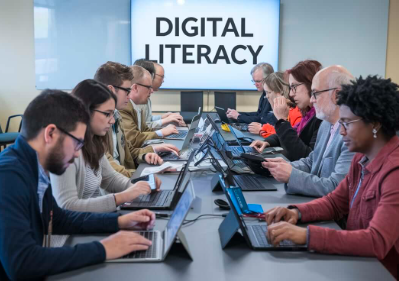In today’s rapidly evolving academic and professional landscape, digital literacy has become more than just a helpful skill—it’s an essential part of student success. As technology continues to influence how we learn, communicate, and work, students in 2025 must be equipped not only to use digital tools but to understand them critically and responsibly.
Understanding Digital Literacy
Digital literacy goes beyond basic computer use. It includes the ability to locate, evaluate, and create information using digital technology. This means understanding online platforms, navigating search engines effectively, interpreting digital media, using collaboration tools, and practicing responsible digital citizenship.
In essence, digital literacy empowers students to thrive in tech-driven learning environments and prepares them for future workplaces where digital interaction is the norm.
The Role of Digital Tools in Education
Modern classrooms increasingly rely on educational technology. From virtual learning platforms and digital textbooks to real-time collaboration software, these tools have changed the way students access information and engage with course content.
In 2025, many academic institutions continue to blend in-person learning with digital formats. Students who are digitally literate can adapt quickly to hybrid or fully online classrooms, stay organized using digital calendars and note-taking tools, and collaborate effectively through platforms like Google Workspace or Microsoft Teams.
Digital Literacy and Critical Thinking
One of the most valuable aspects of digital literacy is the ability to think critically about online content. With the vast amount of information available online, students must learn how to distinguish between reliable sources and misleading content. This skill not only enhances academic research but also fosters independent thinking and media awareness.
Digital literacy teaches students how to question sources, recognize bias, and make informed decisions about what they read, share, and trust online.
Preparing for the Future Workplace
The workplace of the future—across virtually every industry—is shaped by digital processes. From cloud computing and data analytics to digital marketing and remote collaboration, employers value candidates who can navigate digital systems confidently.
Students who build digital literacy early will have a competitive advantage. They will be better prepared to adapt to evolving job requirements, contribute meaningfully in digital workspaces, and continue learning new tools as technology advances.
Encouraging Responsible Online Behavior
With increased digital engagement comes the responsibility to use online platforms safely and respectfully. Digital literacy encourages students to be mindful of their digital footprint, understand online privacy, and interact respectfully on digital platforms.
Schools and educators play a key role in promoting these values, ensuring students grow into ethical, thoughtful digital citizens.
Conclusion
As we look ahead to the future of education, one thing is clear: digital literacy is no longer optional. It’s a foundational skill that supports academic achievement, personal growth, and long-term career success. By developing strong digital skills in 2025, students not only improve their learning experience but also prepare themselves for the challenges and opportunities of the digital age.













